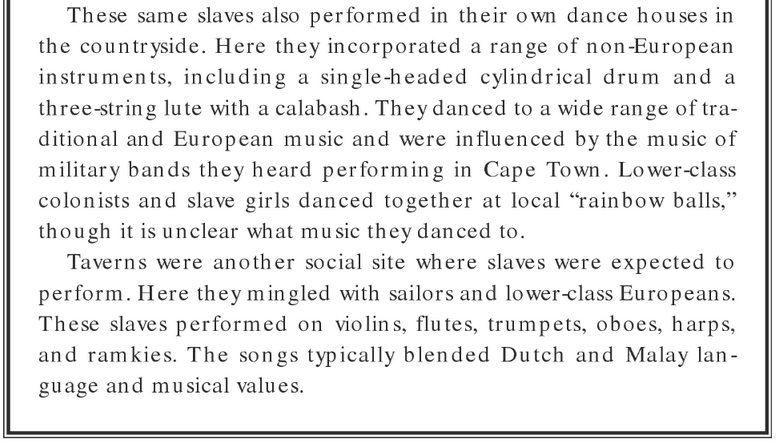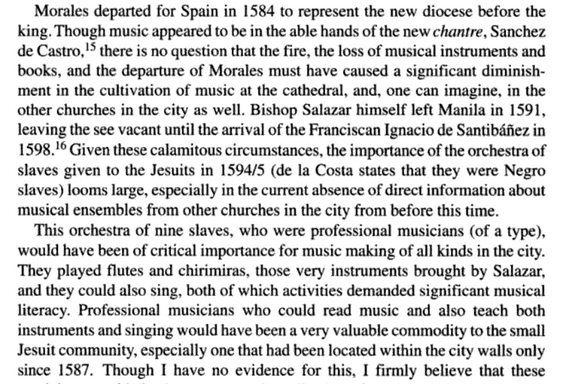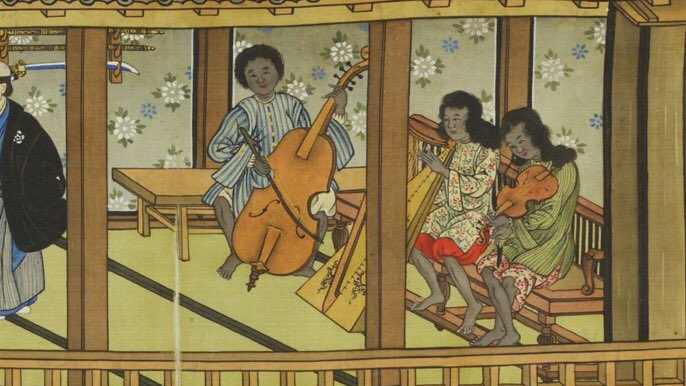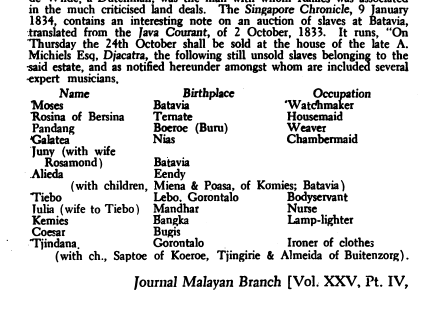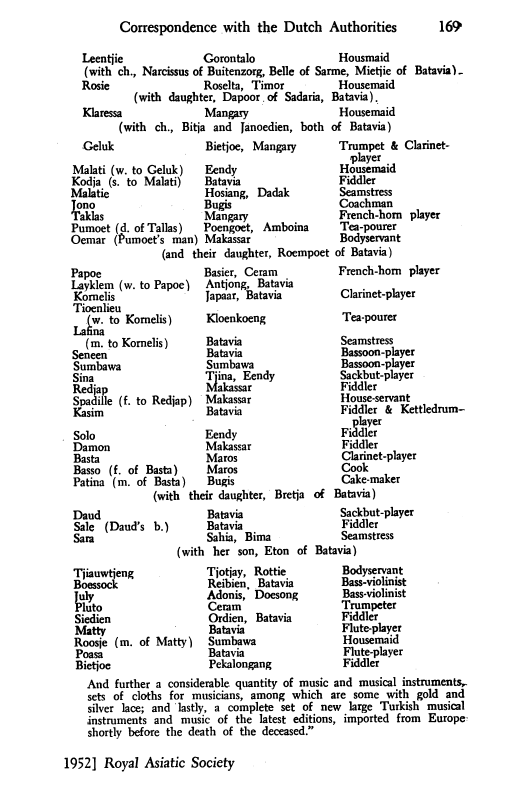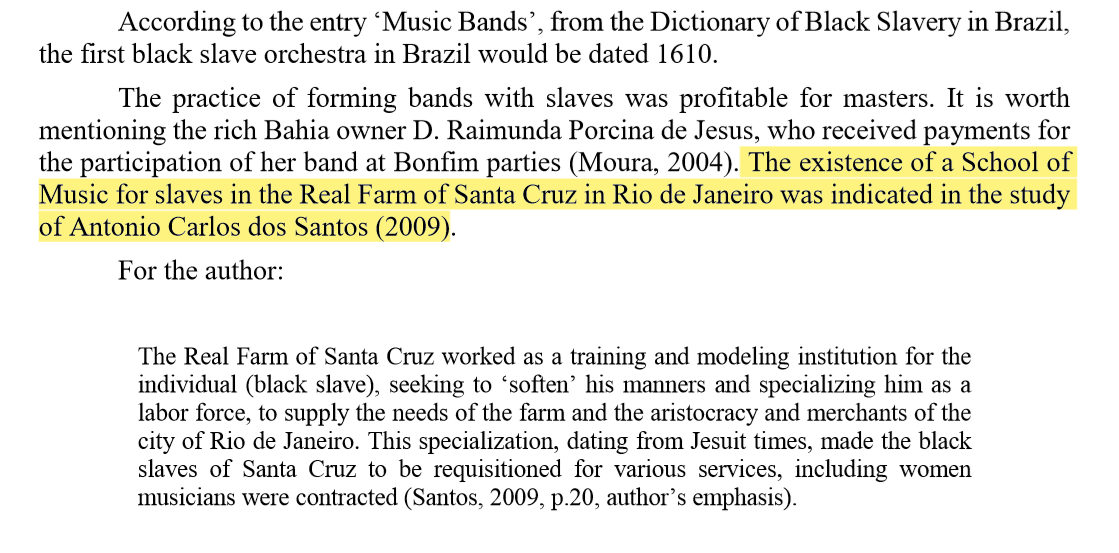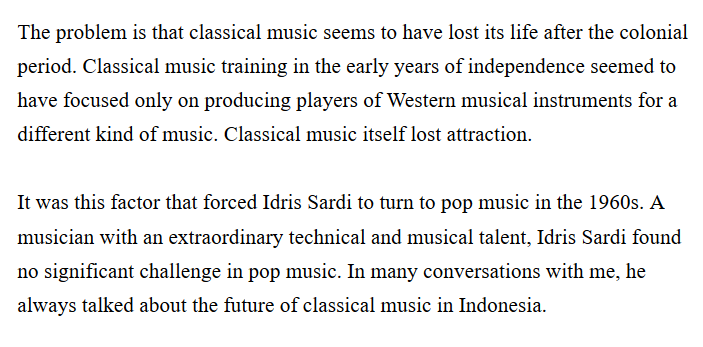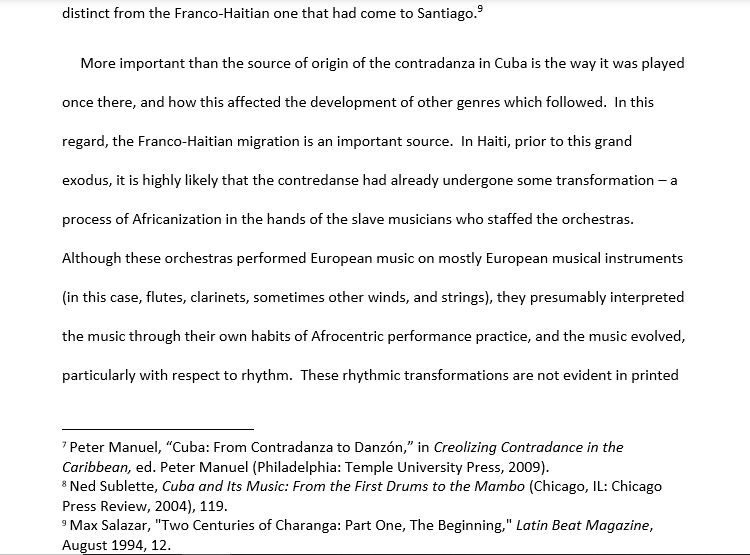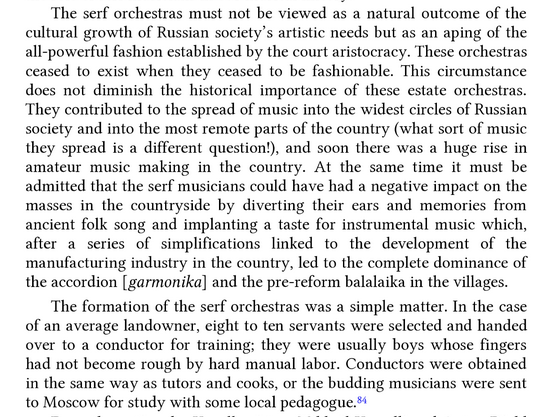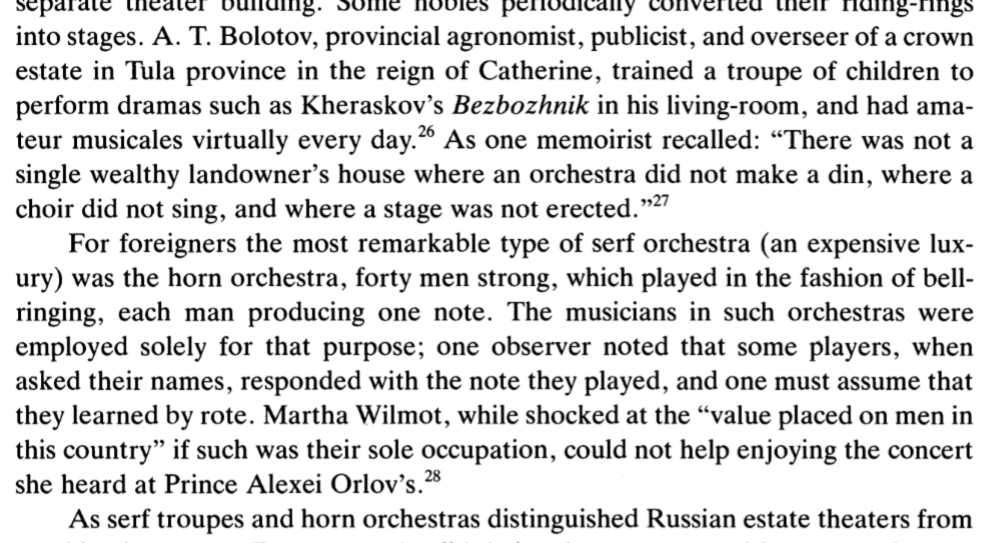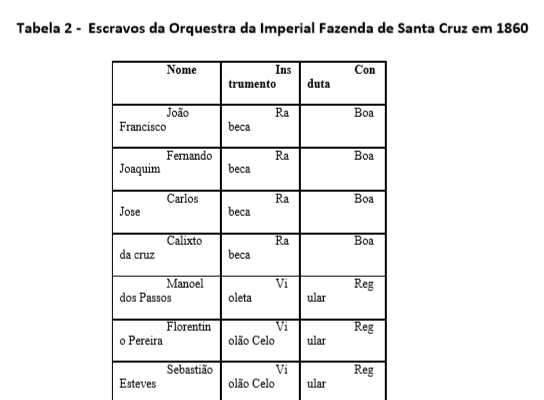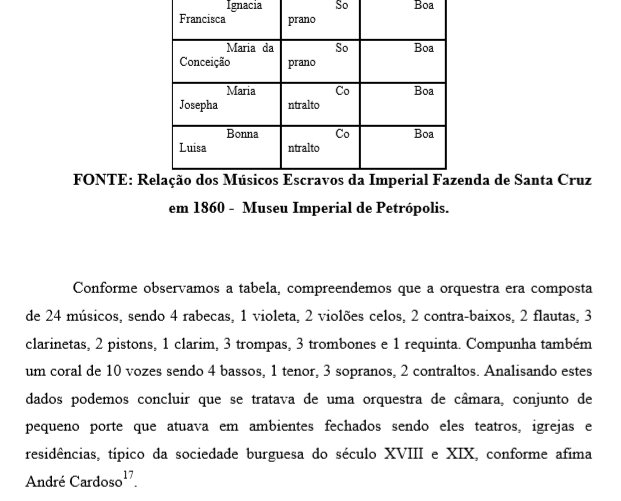<— Learning more about Slave Orchestras around the world than I ever thought, or really wanted, to know. As if forced assimilation of assimilation of oppressed groups through music wasn’t enough...
João Furtado de Mendonça, as early as 1610, "maintained a private orchestra & choir of black slaves, 20- to 30-strong." From pg 134 in Chapter 8 section on Brazilian Slave Orchestras (Peter Fryer's "Rhythms of Resistance: African Musical Heritage in Brazil")
Image from pg 141.
Image from pg 141.
This snippet about slave orchestras in South Africa.
From Chapter 3 of Carol Ann Muller's "South African Music: A Century of Traditions in Transformation, Volume 1," page 65.
From Chapter 3 of Carol Ann Muller's "South African Music: A Century of Traditions in Transformation, Volume 1," page 65.
From the first chapter ("Colonialism in Indonesia") of Danielle Fosler-Lussier's "Music on the Move" pp. 24-25, describes Augustijn Michiels' slave orchestra in capital of the Dutch colony, Batavia (modern day Jakarta) late early 1800s.
Small slave orchestras in Manila as early as late 1500s in William Summers' "The Jesuits in Manila, 1581-1621: The Role of Music in Rite, Ritual, and Spectacle." Page 661 in Chapter 31 of "The Jesuits: Cultures, Sciences, and the Arts, 1540-1773" Eds. John W. O’Malley, et al
Muddying the waters a bit now. W. Bobowski (1610-1675) was a slave in the Ottoman Empire. A trained musician, he wrote Ottoman Classical Music and is included in *that* canon (cf. D. Cantemir).
Didn't take me long while learning rep from that part of the world to discover them.
Didn't take me long while learning rep from that part of the world to discover them.
Ambionese musician slaves in Dutch trading compound of Dejima in Nagasaki. Japanese silk scroll from late 18th century (depicts earlier Edo period). Slaves from Ambon, Malaku (Indonesia). An estimated million or more Indonesians & other SE Asians were sold & traded by the Dutch.
List including Indonesian slave orchestra for auction at Jakarta 1833. From Hare's correspondence w/ Dutch authorities.
168-169 "Documents relating to John Clunies Ross, Alexander Hare & the early history of the settlement on the Cocos-Keeline Islands"
https://www-jstor-org.proxyse.uits.iu.edu/stable/41502769
168-169 "Documents relating to John Clunies Ross, Alexander Hare & the early history of the settlement on the Cocos-Keeline Islands"
https://www-jstor-org.proxyse.uits.iu.edu/stable/41502769
Learned about Dédé a few years ago when I discovered New Orleans had opera in the late 1700s. The piece linked below makes me wonder whether Haiti had slave opera companies. At the very least possibly slave pit orchestras for opera.
https://www.wwno.org/post/edmond-d-d-classical-composer-youve-never-heard
https://www.wwno.org/post/edmond-d-d-classical-composer-youve-never-heard
"The Dutch were reportedly struck by the musical talent of the Javanese musicians in Batavia and their ability to play Western baroque music, and sought to showcase their talents in a public setting. Even if it meant enslaving the musicians." https://www.thejakartapost.com/life/2018/03/29/la-baroque-nomade-the-travelers-of-music.html
"Music formed an important part of this cultural transfer, as slaves were expected to sing for the entertainment of their masters, thereby learning European folk songs and music genres in their masters’ homes." https://brill.com/view/book/9789004314986/B9789004314986_015.xml
If I were racist,
I’d also ignore that
There were literally
Orchestras of slaves
From the Trans-Atlantic, and
Trans-Pacific slave trade
Playing the ‘Great White Canon’
While Mozart, Haydn,
Beethoven, and Bach
Were alive. https://twitter.com/drhannahrobbins/status/1288026244873949184
I’d also ignore that
There were literally
Orchestras of slaves
From the Trans-Atlantic, and
Trans-Pacific slave trade
Playing the ‘Great White Canon’
While Mozart, Haydn,
Beethoven, and Bach
Were alive. https://twitter.com/drhannahrobbins/status/1288026244873949184
Groot Constantia, a Dutch Wine Estate in South Africa (1685-1885):
"Guests were amazed by Cloete's slave orchestra: "He was customarily awakened each morning with a performance by 15 of his slaves who were good musicians"
https://www.jstor.org/stable/41056437
https://slavery.iziko.org.za/cloeteera
"Guests were amazed by Cloete's slave orchestra: "He was customarily awakened each morning with a performance by 15 of his slaves who were good musicians"
https://www.jstor.org/stable/41056437
https://slavery.iziko.org.za/cloeteera
Slave bands were also regularly used to entertain whites in the US. Whether slaves were used in orchestras as in other parts of the world I've yet to find, but Pre Civil War orchestras in the US were already relatively rare.
https://www-jstor-org.proxyse.uits.iu.edu/stable/894726
https://www-jstor-org.proxyse.uits.iu.edu/stable/895685
https://www-jstor-org.proxyse.uits.iu.edu/stable/894726
https://www-jstor-org.proxyse.uits.iu.edu/stable/895685
“When oppressors move in and take over a culture—or participate in human trafficking and the assimilation of captives into a foreign land for further exploitation—the oppressed humans survive by adapting to the cultural whims of their oppressors.” https://www.icareifyoulisten.com/2020/07/out-of-context-7-owning-language-of-our-oppressors/
Needed to summarize some of this about slave orchestras.
"What if we started teaching the history of classical music that hasn’t white-washed out slavery and colonialism? How will we discuss how composers and patrons benefited from the slave trade?" https://silpayamanant.wordpress.com/2020/07/30/classical-music-and-its-slave-orchestras/
"What if we started teaching the history of classical music that hasn’t white-washed out slavery and colonialism? How will we discuss how composers and patrons benefited from the slave trade?" https://silpayamanant.wordpress.com/2020/07/30/classical-music-and-its-slave-orchestras/
Probably shouldn't be surprising that there were Music Schools for slaves.
from "Knowledge that is announced: the power of the word in times of slavery (Rio de Janeiro, 1830-1888)" Alexandra Lima da Silva
http://dx.doi.org/10.4025/rbhe.v18.2018.e002
from "Knowledge that is announced: the power of the word in times of slavery (Rio de Janeiro, 1830-1888)" Alexandra Lima da Silva
http://dx.doi.org/10.4025/rbhe.v18.2018.e002
Also must apologize for not linking to Hannah Templeton's "Mozart and the Slave Trade" piece in my post. I've edited and included the link, but here it is for those who were looking or couldn't find it online: https://hannahmtempleton.wordpress.com/2016/04/30/mozart-and-the-slave-trade/
Governing the action of others—yup! https://twitter.com/vijayiyer/status/1289599184933445632
This fascinating obituary of Indonesian violinist, Idris Sardi, highlights the aftermath of colonial legacy of the slave orchestras ecosystem. In a country w/ its own indigenous centuries long large ensemble trad. (Gamelan) this shouldn't be surprising.
https://magz.tempo.co/read/28217/the-death-of-a-maestro
https://magz.tempo.co/read/28217/the-death-of-a-maestro
Jessica Valiente's dissertation "Siento una Flauta: Improvisational Idiom, Style, and Performance Practice of Charanga Flutists in New York from 1960 to 2000" discusses French Haitian slave orchestras' influence on Cuban Charanga (Chapter 1, pp. 7-22).
https://academicworks.cuny.edu/gc_etds/1170/
https://academicworks.cuny.edu/gc_etds/1170/
Happening concurrently to the existence of European slave orchestras in colonies around the world were serf orchestras in Russia and some parts of Eastern Europe. Snippet from "History of Music in Russia from Antiquity to 1800, Vol. 2" - Nikolai Findeizen
https://iupress.org/9780253348265/history-of-music-in-russia-from-antiquity-to-1800-vol-2/
https://iupress.org/9780253348265/history-of-music-in-russia-from-antiquity-to-1800-vol-2/
Did I mention there were slave choirs too? from Fryer's "Rhythms of Resistance: African Musical Heritage in Brazil"
Chapter 8, pg. 134.
Chapter 8, pg. 134.
A few people have brought up the Russian horn orchestra in response to my slave orchestra piece. Here's a snippet from Priscilla R. Roosevelt's "Emerald Thrones and Living Statues: Theater and Theatricality on the Russian Estate" pg. 7
https://www-jstor-org.proxyse.uits.iu.edu/stable/130207
https://www-jstor-org.proxyse.uits.iu.edu/stable/130207
The history of the slave trade and colonialism should absolutely be included in the history of classical music! https://twitter.com/DrMaDMo/status/1291352239886479361
This is so much a part of the legacy of colonized countries and peoples! https://twitter.com/dr_ndodanabreen/status/1291367914579386368
This sounded like a fascinating project! https://datebook.sfchronicle.com/music/jordi-savall-maps-out-the-routes-of-slavery-with-music
Here's David Hunter's most recently published paper (2019) on Handel and his profiteering from the slave trade. https://www.questia.com/library/journal/1G1-601219355/handel-manuscripts-and-the-profits-of-slavery-the
"Wealthy families engaged in the slave trade and used this financial capital to build up cultural capital in the musical culture of the day, hiring musicians, purchasing manuscripts and scores, and musical instruments and funding concerts."
https://warwick.ac.uk/fac/arts/history/ghcc/blog/musicandempire/
https://warwick.ac.uk/fac/arts/history/ghcc/blog/musicandempire/
Can we be sure this wasn’t a slave musician? The Dutch did use slave musicians in Indonesia and South Africa as early as the beginning of the 1600s. They regularly “toured” them as well. https://twitter.com/drcanonic/status/1295795650286755842
Starting to dig into non-English sources. Piece I found in a Brazilian academic database about the Imperial Plantation in Santa Cruz, Rio. One of the documents lists the slaves and instrumentation of the 34 piece chamber orchestra/choir during the 1860s.
http://www.revista.universo.edu.br/index.php?journal=1reta2&page=article&op=view&path%5B%5D=2584&path%5B%5D=0
http://www.revista.universo.edu.br/index.php?journal=1reta2&page=article&op=view&path%5B%5D=2584&path%5B%5D=0
We still have so much to learn! https://twitter.com/katherineschof8/status/1316726954574438400
Another thread in Slave Bands in Brazil, which existed until the abolition of slavery there in 1888. https://twitter.com/Silpayamanant/status/1316389302469885952

 Read on Twitter
Read on Twitter

